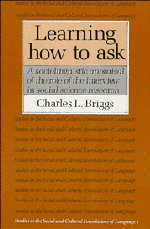 Learning How to Ask
Learning How to Ask Book contents
- Frontmatter
- Contents
- Foreword by Aaron V. Cicourel
- Preface
- 1 Introduction
- 2 The setting: Mexicano society and Córdova, New Mexico
- 3 Interview techniques vis-à-vis native metacommunicative repertoires; or, on the analysis of communicative blunders
- 4 The acquisition of metacommunicative competence
- 5 Listen before you leap: toward methodological sophistication
- 6 Conclusion: theoretical quagmires and “purely methodological” issues
- Notes
- References
- Index
Preface
Published online by Cambridge University Press: 05 June 2012
- Frontmatter
- Contents
- Foreword by Aaron V. Cicourel
- Preface
- 1 Introduction
- 2 The setting: Mexicano society and Córdova, New Mexico
- 3 Interview techniques vis-à-vis native metacommunicative repertoires; or, on the analysis of communicative blunders
- 4 The acquisition of metacommunicative competence
- 5 Listen before you leap: toward methodological sophistication
- 6 Conclusion: theoretical quagmires and “purely methodological” issues
- Notes
- References
- Index
Summary
This book has been a real challenge to write, and I hope it proves equally challenging to its readers. Nothing is harder than opening up questions that we already think are solved, finding crevasses and quicksand in what everyone sees as solid ground. Overcoming our reluctance to open Pandora's boxes is especially acute when it comes to “purely methodological” issues. Collecting data is viewed as an intrinsically sound, if not necessarily glamorous, pursuit. The realm of pure theory is exciting and important, even if empirically minded skeptics are likely to dismiss one's efforts as vapid. But methodology loses on both counts, being generally regarded as both mundane and unimportant.
These prejudices guided my initial work on the subject. More than a decade of fieldwork with Mexicanos in northern New Mexico had sensitized me to ways in which the interview, as a speech event, limits speakers' abilities to use expressions, such as proverbs, that are deeply rooted in a given interaction. This induced me to review field recordings of interviews in examining the nature of this mode of communication and the problems it presents. I was not surprised to find that my initial interviews (in 1972) had encountered numerous sociolinguistic obstacles (see Chapter 3). I subsequently adopted many features of the dialect, learned some basic social skills, became acquainted with the residents, and gained a sense of their background and present concerns.
- Type
- Chapter
- Information
- Learning How to AskA Sociolinguistic Appraisal of the Role of the Interview in Social Science Research, pp. xiii - xviPublisher: Cambridge University PressPrint publication year: 1986


